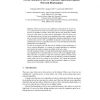Free Online Productivity Tools
i2Speak
i2Symbol
i2OCR
iTex2Img
iWeb2Print
iWeb2Shot
i2Type
iPdf2Split
iPdf2Merge
i2Bopomofo
i2Arabic
i2Style
i2Image
i2PDF
iLatex2Rtf
Sci2ools
AINTEC
2005
Springer
2005
Springer
On the Stability of Server Selection Algorithms Against Network Fluctuations
Abstract. When a set of servers are available for a certain client-server style service, a client selects one of the servers using some server selection algorithm. The best-server algorithm in which a client selects the best one among the available servers by some metric is widely used for performance. However, when a network fluctuation occurs, the best-server algorithm often causes a sudden shift of the server load and could amplify the fluctuation. Reciprocal algorithms in which a client selects a server with a probability reciprocal to some metric are more stable than the best-server algorithm in the face of network fluctuations but their performance is not satisfactory. In order to investigate trade-offs between the stability and the performance in server selection algorithms, we evaluate the existing algorithms by simulation and visualize the results to capture the stability of the server load. From the simulation results, we found that the performance problem of the reciproca...
Related Content
| Added | 26 Jun 2010 |
| Updated | 26 Jun 2010 |
| Type | Conference |
| Year | 2005 |
| Where | AINTEC |
| Authors | Toshiyuki Miyachi, Kenjiro Cho, Yoichi Shinoda |
Comments (0)

